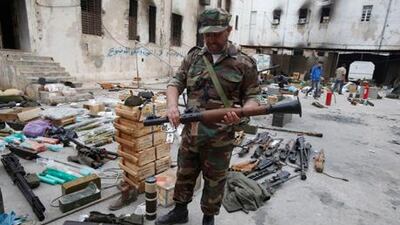Powerful military elites decided the outcome of Egypt and Tunisia's revolutions, but in Libya it is the obscure matrix of tribal structures that is more likely to dictate events.
"All the tribes support me", Muammar Qaddafi boasted during his rambling TV address on Tuesday night. It was a patent falsehood. One by one, Libya's more than 20 major tribes appear to be turning against the Libyan leader.
"We tell brother Qaddafi - well he's no longer a brother - we tell him to leave the country," Akram al Warfalli, a leading figure in the Warfalla tribe, said on Sunday. The Warfalla are one of Libya's biggest tribes, thought to comprise about a million of the total population of more than six million.
Also on Sunday, the leader of the eastern Al Zuwayya tribe threatened to stem the flow of oil to the west of the country if the Qaddafi regime does not stop its violence against the Libyan people.
______________________
______________________
"In Libya, it will be the tribal system that will hold the balance of power rather than the military," said Alia Brahimi, head of the North Africa Programme at the London School of Economics. "Qaddafi has largely dismissed the older tribal military structures but they will probably not have huge problems finding guns."
Most aggrieved are the tribes in eastern Libya, home to much of the nation's oil resources and now beyond Colonel Qaddafi's control.
They say the Libyan leader has favoured tribes in and around the capital, Tripoli, at their expense. Members of the Libyan security forces in the east were among the first to revolt.
Colonel Qaddafi's son, Saif al Islam, has raised the spectre of civil war if the anti-government demonstrations continue, with members of different tribes "killing each other in the streets".
But a top commander of Libya's eastern forces in Tobruk, until he defected from the army a few days ago, insisted such talk was scaremongering nonsense.
"This is propaganda that if Qaddafi dies, then Libya will fall apart in civil war," Maj Gen Suleiman Mahmoud said. "Libyan society is united. We have responsible and capable generals and academics who can step up when Mr Qaddafi falls."
The Libyan leader's iron-fisted response to popular unrest has resulted in formerly rival tribes uniting against him, other experts said. The prospect of civil war will materialise only if the regime, as Colonel Qaddafi has pledged, fights to the end, they believe.
Then the bloody denouement will be between the Libyan leader and his loyalists on the one side, and anti-regime forces on the other. Tribal affiliation is likely to play little part.
However, the defection of senior tribal leaders will sap the morale of the Qaddafi regime, undermine its claims to legitimacy, and encourage more dissent.
Tribal kinship has declined in recent years because of the growth in education and urbanisation, which removed people from their traditional tribal areas. But many Libyans still identify themselves as affiliated to a tribe.
Even so, experts say the importance of tribes and their chiefs should not be exaggerated. Sir Richard Dalton, a British former ambassador to Libya, said: "They don't have any organisational structure to give them a formal role in public affairs. But in a time of crisis, tribes can take on more importance."
Libyan tribes played an important role in the country's struggle against italian colonial rule between 1912 and 1943, but when Colonel Qaddafi seized power in 1969, he promised to eliminate tribalism. In reality, experts say, he entrenched it.
As his popularity dwindled, he relied increasingly on tribalism to bolster his grip on power while pacifying tribes mainly through economic privileges, marital alliances or the threat of force.
"He also tried to ensure there was a rough balance between the tribes in government and other state apparatus," Sir Richard said in a telephone interview from London.
The balance in the armed forces, however, was skewed in favour of certain tribes as Colonel Qaddafi stoked rivalries in a divide-and-rule policy to bolster his own power.
Unsurprisingly, he bestowed selective patronage on his own small Al Qaddadfa tribe, staffing elite military units with its tribesmen to guarantee his personal security and that of his government.
This led to rivalry in the armed forces with other tribes, in particular the larger Magariha, the tribe of the Lockerbie bomber, Abdelbaset Ali al Megrahi. The bombing of the Pan-Am jumbo jet in December 1988 killed all 259 people on board and 11 people on the ground in Lockerbie in southwest Scotland.
Some Arab analysts say the Magariha, which is close to the Warfalla tribe, is best positioned to carry out a coup against Colonel Qaddafi because many of its members are in senior government and security services positions.
What is clear is that Colonel Qaddafi can no longer rely on his once adept manipulation of tribal rivalries to shore up his increasingly tenuous grip on power.

